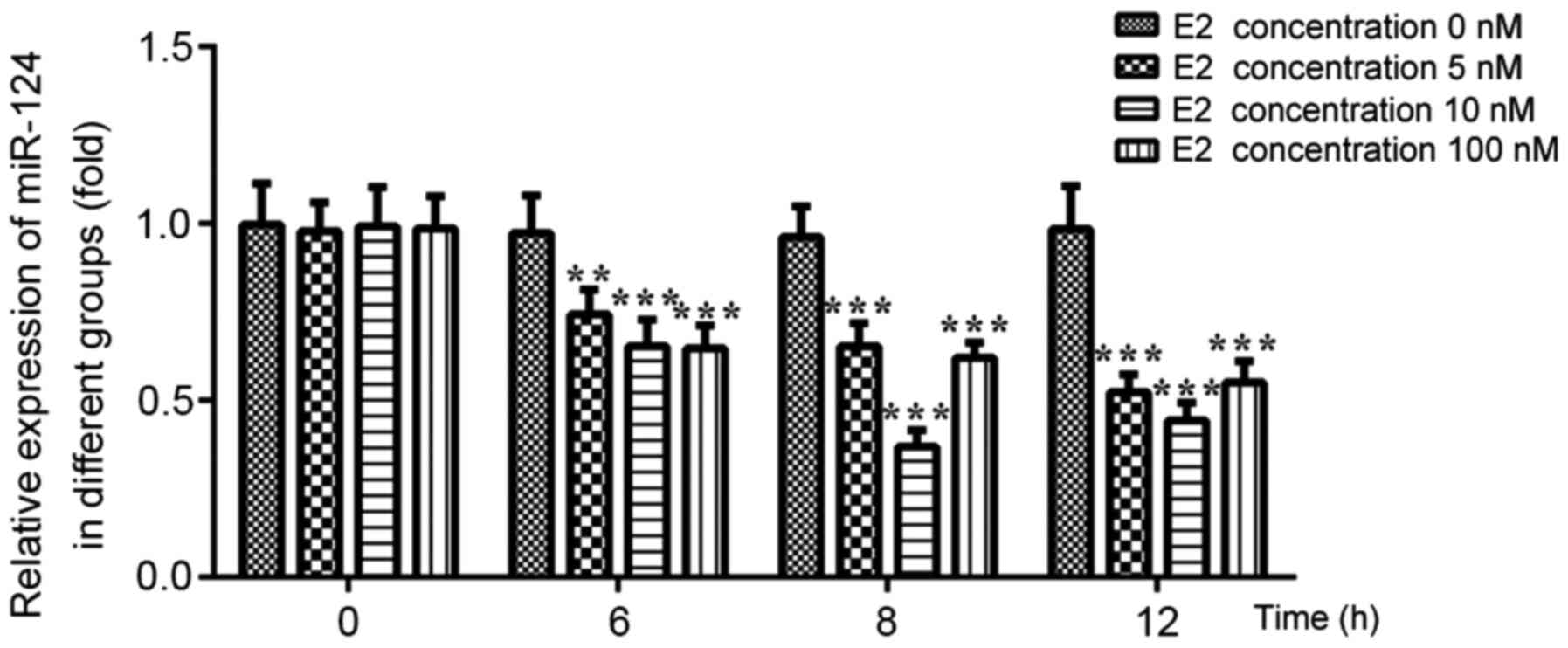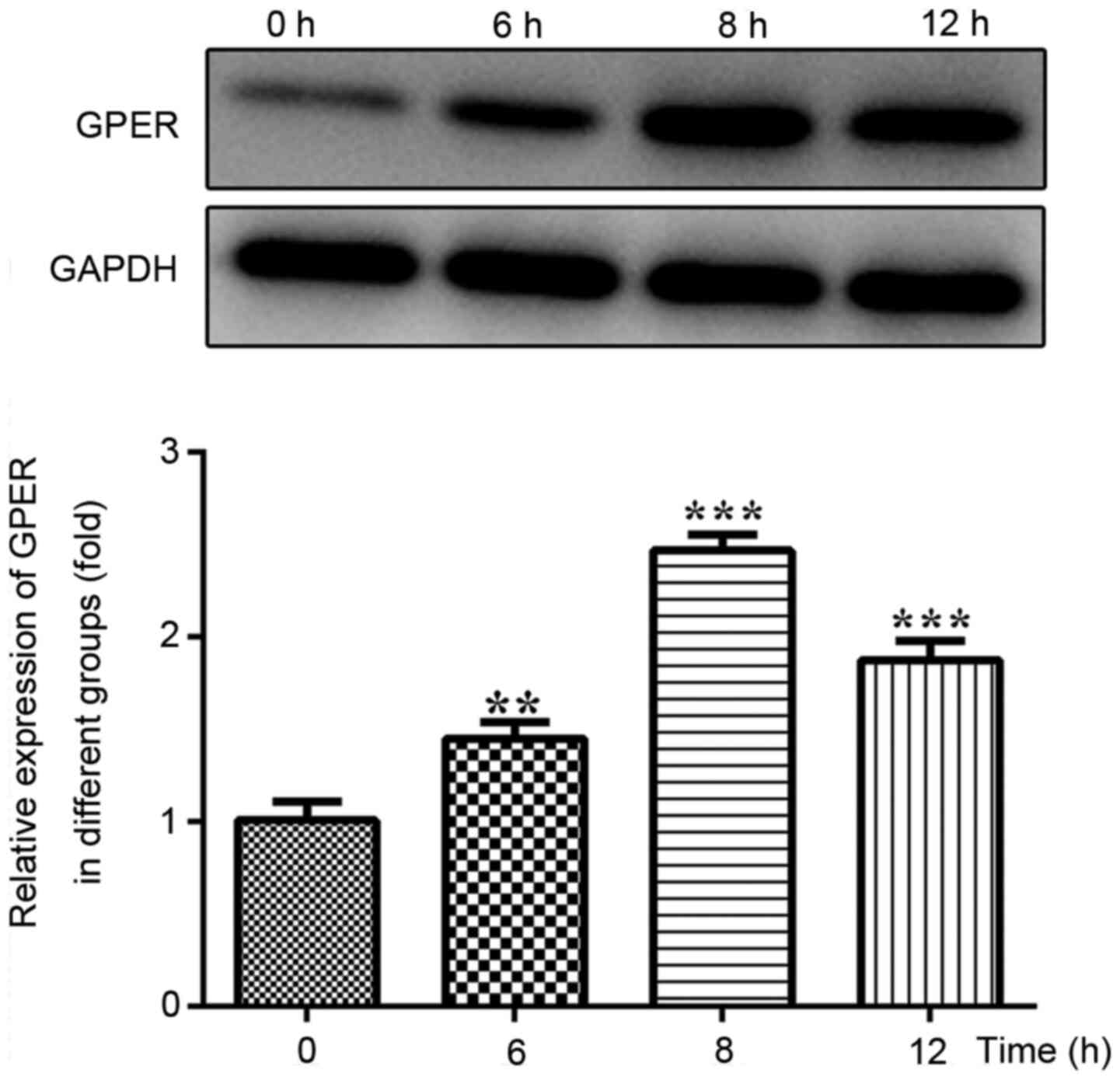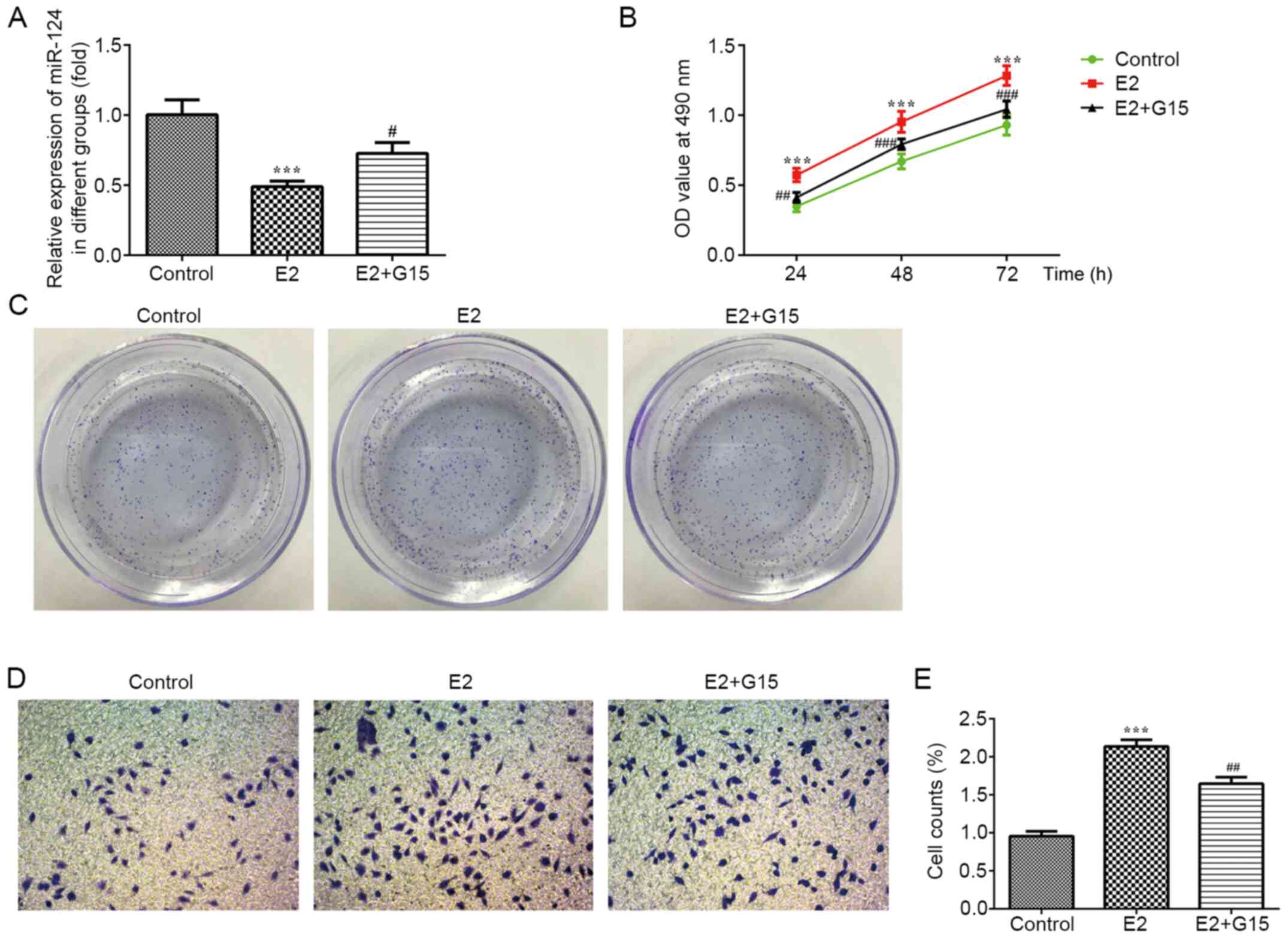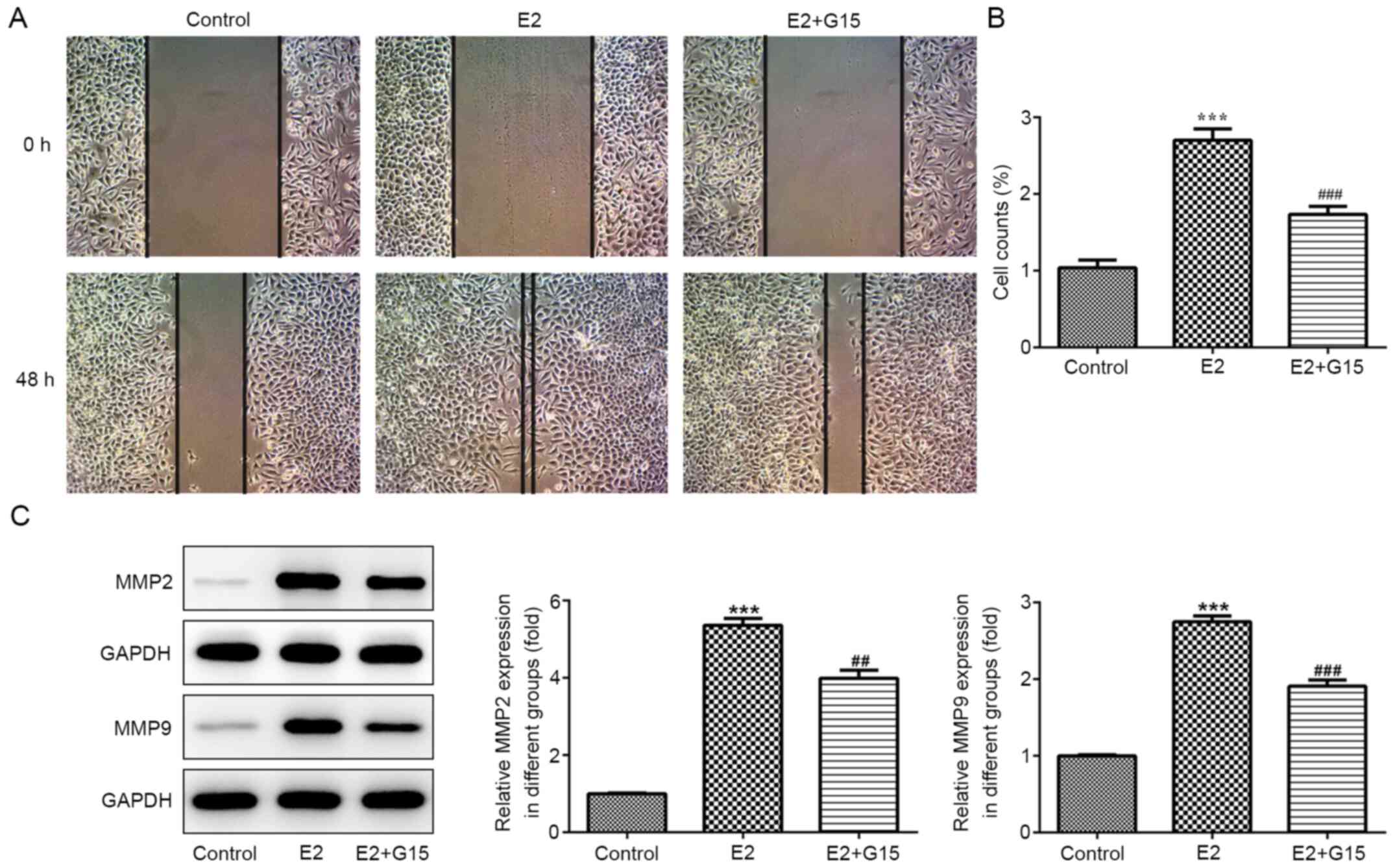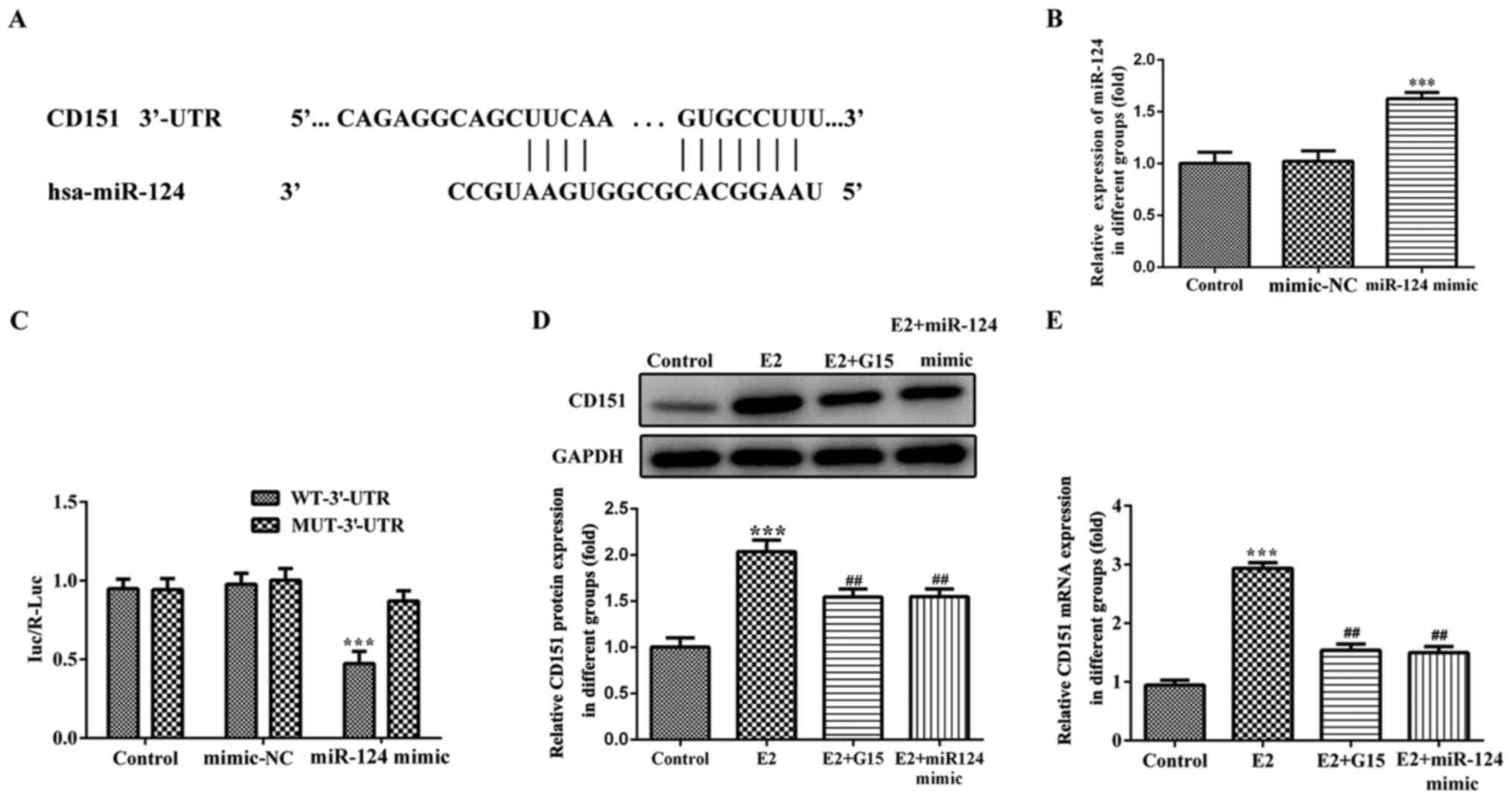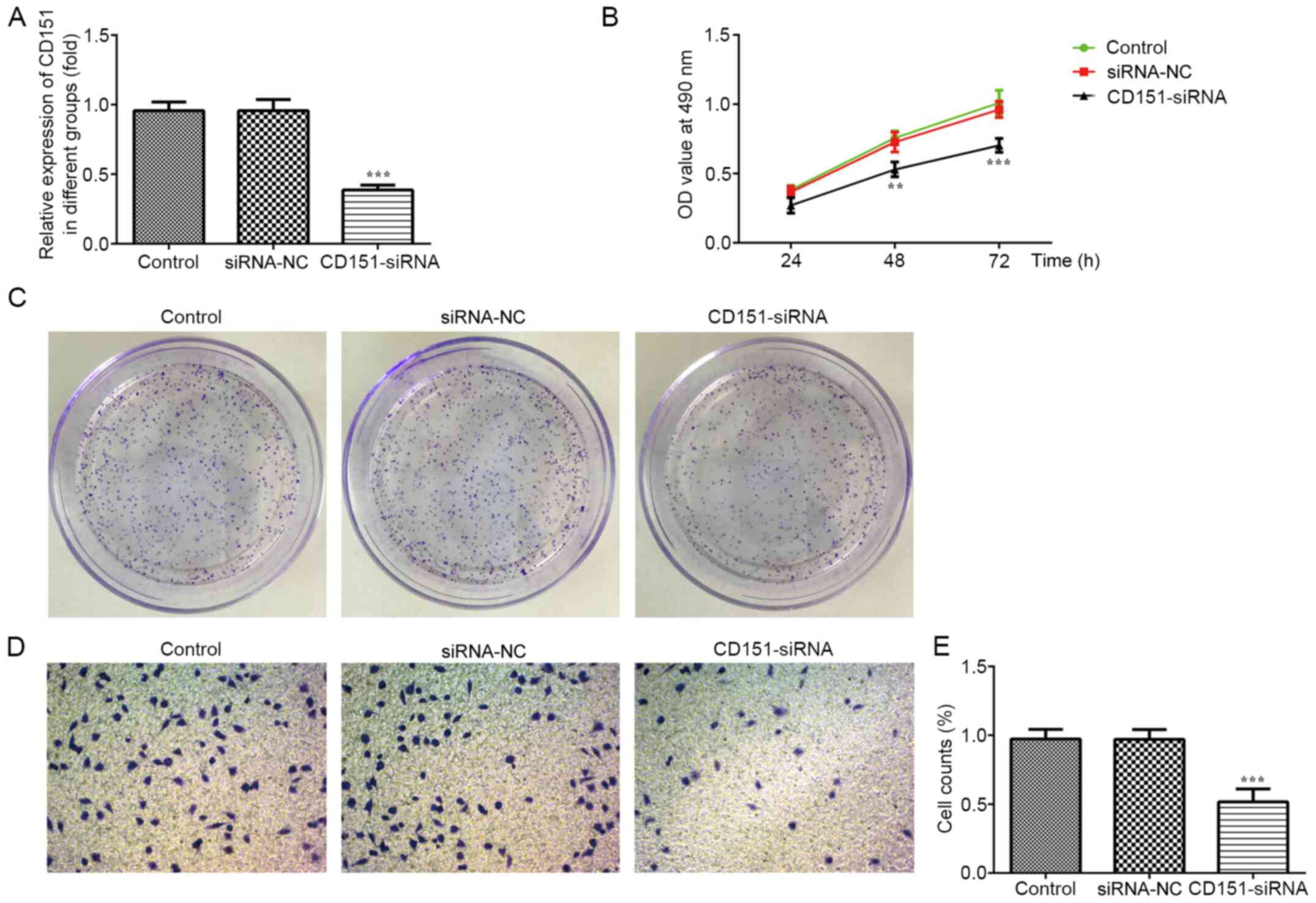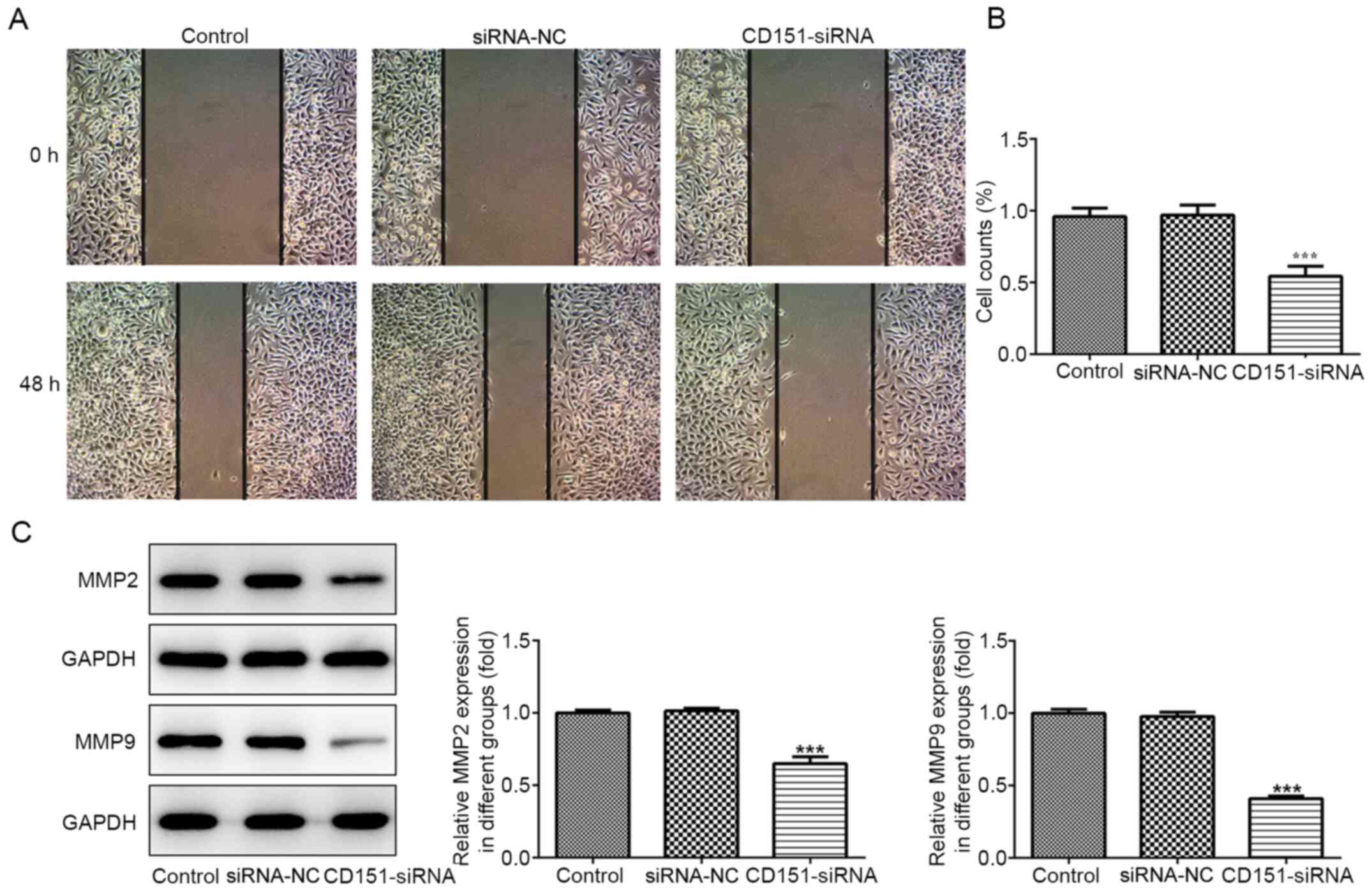|
1
|
Siegel RL, Miller KD and Jemal A: Cancer
statistics, 2017. CA Cancer J Clin. 67:7–30. 2017. View Article : Google Scholar : PubMed/NCBI
|
|
2
|
DeSantis CE, Ma J, Goding Sauer A, Newman
LA and Jemal A: Breast cancer statistics, 2017, racial disparity in
mortality by state. CA Cancer J Clin. 67:439–448. 2017. View Article : Google Scholar : PubMed/NCBI
|
|
3
|
Siegel RL, Miller KD and Jemal A: Cancer
statistics, 2018. CA Cancer J Clin. 68:7–30. 2018. View Article : Google Scholar : PubMed/NCBI
|
|
4
|
Bartelink H, Horiot JC, Poortmans P,
Struikmans H, Van den Bogaert W, Barillot I, Fourquet A, Borger J,
Jager J, Hoogenraad W, et al: Recurrence rates after treatment of
breast cancer with standard radiotherapy with or without additional
radiation. N Engl J Med. 345:1378–1387. 2001. View Article : Google Scholar : PubMed/NCBI
|
|
5
|
Mattiuzzi C and Lippi G: Current cancer
epidemiology. J Epidemiol Glob Health. 9:217–222. 2019. View Article : Google Scholar : PubMed/NCBI
|
|
6
|
Clayforth C, Fritschi L, McEvoy SP, Byrne
MJ, Ingram D, Sterrett G, Harvey JM, Joseph D and Jamrozik K:
Five-year survival from breast cancer in Western Australia over a
decade. Breast. 16:375–381. 2007. View Article : Google Scholar : PubMed/NCBI
|
|
7
|
Yuan J, Xiao C, Lu H, Yu H, Hong H, Guo C
and Wu Z: miR-200b regulates breast cancer cell proliferation and
invasion by targeting radixin. Exp Ther Med. 19:2741–2750.
2020.PubMed/NCBI
|
|
8
|
Si CS, Yu Q and Yao YF: Effect of
miR-146a-5p on proliferation and metastasis of triple-negative
breast cancer via regulation of SOX5. Exp Ther Med. 15:4515–4521.
2018.PubMed/NCBI
|
|
9
|
Yager JD and Davidson NE: Estrogen
carcinogenesis in breast cancer. N Engl J Med. 354:270–282. 2006.
View Article : Google Scholar : PubMed/NCBI
|
|
10
|
Holden MP and Hampson E: Endogenous
variation in estradiol in women affects the weighting of metric and
categorical information in spatial location memory. Horm Behav.
128:62021. View Article : Google Scholar
|
|
11
|
Mantri AV, Allaway HCM, Brezicha JE, Hogan
HA and Bloomfield SA: Oral estradiol impact on mitigating
unloading-induced bone loss in ovary-intact rats. Aerosp Med Hum
Perform. 92:65–74. 2021. View Article : Google Scholar : PubMed/NCBI
|
|
12
|
Fang GZ, Huang GY, Ying GG, Qiu SQ, Shi
WJ, Xie L, Yang YY and Ma DD: Endocrine disrupting effects of
binary mixtures of 17β-estradiol and testosterone in adult female
western mosquitofish (Gambusia affinis). Ecotox Environ Safe.
208:1115662021. View Article : Google Scholar
|
|
13
|
Huang S, Liu M, Fu F, Liu H, He B, Xiao D
and Yang J: High serum estradiol reduces acute hepatotoxicity risk
induced by epirubicin plus cyclophosphamide chemotherapy in
premenopausal women with breast cancer. Front Pharmacol.
11:5724442021. View Article : Google Scholar : PubMed/NCBI
|
|
14
|
Shang D, Li Z, Zhu Z, Chen H, Zhao L, Wang
X and Chen Y: Baicalein suppresses 17-β-estradiol-induced
migration, adhesion and invasion of breast cancer cells via the G
protein -coupled receptor 30 signaling pathway. Oncol Rep.
33:2077–2085. 2015. View Article : Google Scholar : PubMed/NCBI
|
|
15
|
Ignatov A, Ignatov T, Roessner A, Costa SD
and Kalinski T: Role of GPR30 in the mechanisms of tamoxifen
resistance in breast cancer MCF-7 cells. Breast Cancer Res Treat.
123:87–96. 2010. View Article : Google Scholar : PubMed/NCBI
|
|
16
|
Muhammad JS, Guimei M, Jayakumar MN,
Shafarin J, Janeeh AS, AbuJabal R, Eladl MA, Ranade AV, Ali A and
Hamad M: Estrogen-induced hypomethylation and overexpression of
YAP1 facilitate breast cancer cell growth and survival. Neoplasia.
23:68–79. 2021. View Article : Google Scholar : PubMed/NCBI
|
|
17
|
Feng G, Cai J, Huang Y, Zhu X, Gong B,
Yang Z, Yan C, Hu Z, Yang L and Wang Z: G-protein-coupled estrogen
receptor 1 promotes gender disparities in hepatocellular carcinoma
via modulation of SIN1 and mTOR complex 2 activity. Mol Cancer Res.
18:1863–1875. 2020. View Article : Google Scholar : PubMed/NCBI
|
|
18
|
Maggiolini M, Vivacqua A, Fasanella G,
Recchia AG, Sisci D, Pezzi V, Montanaro D, Musti AM, Picard D and
Andò S: The G protein -coupled receptor GPR30 mediates c-fos
up-regulation by 17beta-estradiol and phytoestrogens in breast
cancer cells. J Biol Chem. 279:27008–27016. 2004. View Article : Google Scholar : PubMed/NCBI
|
|
19
|
Vivacqua A, Bonofiglio D, Recchia AG,
Musti AM, Picard D, Andò S and Maggiolini M: The G protein -
coupled receptor GPR30 mediates the proliferative effects induced
by 17beta-estradiol and hydroxytamoxifen in endometrial cancer
cells. Mol Endocrinol. 20:631–646. 2006. View Article : Google Scholar : PubMed/NCBI
|
|
20
|
Revankar CM, Cimino DF, Sklar LA,
Arterburn JB and Prossnitz ER: A transmembrane intracellular
estrogen receptor mediates rapid cell signaling. Science.
307:1625–1630. 2005. View Article : Google Scholar : PubMed/NCBI
|
|
21
|
Filardo EJ, Quinn JA, Bland KI and
Frackelton AR Jr: Estrogen-induced activation of Erk-1 and Erk-2
requires the G protein -coupled receptor homolog, GPR30, and occurs
via trans-activation of the epidermal growth factor receptor
through release of HB-EGF. Mol Endocrinol. 14:1649–1660. 2000.
View Article : Google Scholar : PubMed/NCBI
|
|
22
|
Albanito L, Madeo A, Lappano R, Vivacqua
A, Rago V, Carpino A, Oprea TI, Prossnitz ER, Musti AM, Andò S and
Maggiolini M: G protein -coupled receptor 30 (GPR30) mediates gene
expression changes and growth response to 17beta- estradiol and
selective GPR30 ligand G-1 in ovarian cancer cells. Cancer Res.
67:1859–1866. 2007. View Article : Google Scholar : PubMed/NCBI
|
|
23
|
Vivacqua A, Bonofiglio D, Albanito L,
Madeo A, Rago V, Carpino A, Musti AM, Picard D, Andò S and
Maggiolini M: 17beta-estradiol, genistein, and 4-hydroxytamoxifen
induce the proliferation of thyroid cancer cells through the G
protein -coupled receptor GPR30. Mol Pharmacol. 70:1414–1423. 2006.
View Article : Google Scholar : PubMed/NCBI
|
|
24
|
Thomas P, Pang Y, Filardo EJ and Dong J:
Identity of an estrogen membrane receptor coupled to a G protein in
human breast cancer cells. Endocrinology. 146:624–632. 2005.
View Article : Google Scholar : PubMed/NCBI
|
|
25
|
Liu Q, Li JG, Zheng XY, Jin F and Dong HT:
Expression of CD133, PAX2, ESA, and GPR30 in invasive ductal breast
carcinomas. Chin Med J (Engl). 122:2763–2769. 2009.PubMed/NCBI
|
|
26
|
Bartel DP: MicroRNAs: Target recognition
and regulatory functions. Cell. 136:215–233. 2009. View Article : Google Scholar : PubMed/NCBI
|
|
27
|
Liu S, Chen X, Zhang S, Wang X, Du X, Chen
J and Zhou G: miR-106b-5p targeting SIX1 inhibits TGF-β1-induced
pulmonary fibrosis and epithelial-mesenchymal transition in asthma
through regulation of E2F1. Int J Mol Med. 47:12021. View Article : Google Scholar
|
|
28
|
Wan JH and Liu SS: miR-613 inhibits the
proliferation of human ovarian granulosa cells by arresting cell
cycle progression via the targeting of IGF-1. Mol Med Rep.
23:12021.
|
|
29
|
Dong B, Li SY, Zhu SL, Yi M, Luo S and Wu
K: miRNA- mediated EMT and CSCs in cancer chemoresistance. Exp
Hematol Oncol. 10:122021. View Article : Google Scholar : PubMed/NCBI
|
|
30
|
Cheng LC, Pastrana E, Tavazoie M and
Doetsch F: miR-124 regulates adult neurogenesis in the
subventricular zone stem cell niche. Nat Neurosci. 12:399–408.
2009. View
Article : Google Scholar : PubMed/NCBI
|
|
31
|
Yu JY, Chung KH, Deo M, Thompson RC and
Turner DL: MicroRNA miR-124 regulates neurite outgrowth during
neuronal differentiation. Exp Cell Res. 314:2618–2633. 2008.
View Article : Google Scholar : PubMed/NCBI
|
|
32
|
Makeyev EV, Zhang J, Carrasco MA and
Maniatis T: The MicroRNA miR-124 promotes neuronal differentiation
by triggering brain-specific alternative pre-mRNA splicing. Mol
Cell. 27:435–448. 2007. View Article : Google Scholar : PubMed/NCBI
|
|
33
|
Mishima T, Mizuguchi Y, Kawahigashi Y and
Takizawa T and Takizawa T: RT-PCR-based analysis of microRNA (miR-1
and-124) expression in mouse CNS. Brain Res. 1131:37–43. 2007.
View Article : Google Scholar : PubMed/NCBI
|
|
34
|
Silber J, Lim DA, Petritsch C, Persson AI,
Maunakea AK, Yu M, Vandenberg SR, Ginzinger DG, James CD, Costello
JF, et al: miR-124 and miR-137 inhibit proliferation of
glioblastoma multiforme cells and induce differentiation of brain
tumor stem cells. BMC Med. 6:142008. View Article : Google Scholar : PubMed/NCBI
|
|
35
|
Wong KY, So CC, Loong F, Chung LP, Lam WW,
Liang R, Li GK, Jin DY and Chim CS: Epigenetic inactivation of the
miR-124-1 in haematological malignancies. PLoS One. 6:e190272011.
View Article : Google Scholar : PubMed/NCBI
|
|
36
|
Xia J, Wu Z, Yu C, He W, Zheng H, He Y,
Jian W, Chen L, Zhang L and Li W: miR-124 inhibits cell
proliferation in gastric cancer through down-regulation of SPHK1. J
Pathol. 227:470–480. 2012. View Article : Google Scholar : PubMed/NCBI
|
|
37
|
Jiang CF, Li DM, Shi ZM, Wang L, Liu MM,
Ge X, Liu X, Qian YC, Wen YY, Zhen LL, et al: Estrogen regulates
miRNA expression: Implication of estrogen receptor and miR-124/AKT2
in tumor growth and angiogenesis. Oncotarget. 7:36940–36955. 2016.
View Article : Google Scholar : PubMed/NCBI
|
|
38
|
Wang J, Lei W, Li G, Ma H, Guo H and Li S:
CD151 promotes proliferation and migration of SK-NEP-1 cells via
the GSK-3β/P21/cyclinD signaling pathway. Pathol Res Pract.
215:329–334. 2019. View Article : Google Scholar : PubMed/NCBI
|
|
39
|
Han ZB, Yang Z, Chi Y, Zhang L, Wang Y, Ji
Y, Wang J, Zhao H and Han ZC: MicroRNA-124 suppresses breast cancer
cell growth and motility by targeting CD151. Cell Physiol Biochem.
31:823–832. 2013. View Article : Google Scholar : PubMed/NCBI
|
|
40
|
Li Q, Gao H, Yang H, Wei W and Jiang Y:
Estradiol promotes the progression of ER+ breast cancer through
methylation- mediated RSK4 inactivation. Onco Targets Ther.
12:5907–5916. 2019. View Article : Google Scholar : PubMed/NCBI
|
|
41
|
Khan S, Abdelrahim M, Samudio I and Safe
S: Estrogen receptor/Sp1 complexes are required for induction of
cad gene expression by 17beta-estradiol in breast cancer cells.
Endocrinology. 144:2325–2335. 2003. View Article : Google Scholar : PubMed/NCBI
|
|
42
|
Dennis MK, Burai R, Ramesh C, Petrie WK,
Alcon SN, Nayak TK, Bologa CG, Leitao A, Brailoiu E, Deliu E, et
al: In vivo effects of a GPR30 antagonist. Nat Chem Biol.
5:421–427. 2009. View Article : Google Scholar : PubMed/NCBI
|
|
43
|
Livak KJ and Schmittgen TD: Analysis of
relative gene expression data using real-time quantitative PCR and
the 2(-Delta Delta C(T)) method. Methods. 25:402–408. 2001.
View Article : Google Scholar : PubMed/NCBI
|
|
44
|
Hayashi T, Hikichi M, Yukitake J, Harada N
and Utsumi T: Estradiol suppresses phosphorylation of ERα serine
167 through upregulation of PP2A in breast cancer cells. Oncol
Lett. 14:8060–8065. 2017.PubMed/NCBI
|
|
45
|
Emens LA: Breast cancer immunotherapy:
Facts and hopes. Clin Cancer Res. 24:511–520. 2018. View Article : Google Scholar : PubMed/NCBI
|
|
46
|
Chen WQ, Zheng RS, Baade PD, Zhang S, Zeng
H, Bray F, Jemal A, Yu XQ and He J: Cancer statistics in China,
2015. CA Cancer J Clin. 66:115–132. 2016. View Article : Google Scholar : PubMed/NCBI
|
|
47
|
Yuan S, Huang C, Ji X, Ma M, Rao K and
Wang Z: Prediction of the combined effects of multiple estrogenic
chemicals on MCF-7 human breast cancer cells and a preliminary
molecular exploration of the estrogenic proliferative effects and
related gene expression. Ecotoxicol Environ Saf. 160:1–9. 2018.
View Article : Google Scholar : PubMed/NCBI
|
|
48
|
Parl FF, Crooke PS, Plummer WD Jr and
Dupont WD: Genomic-epidemiologic evidence that estrogens promote
breast cancer development. Cancer Epidemiol Biomarkers Prev.
27:899–907. 2018. View Article : Google Scholar : PubMed/NCBI
|
|
49
|
Sampayo RG, Toscani AM, Rubashkin MG, Thi
K, Masullo LA, Violi IL, Lakins JN, Cáceres A, Hines WC, Coluccio
Leskow F, et al: Fibronectin rescues estrogen receptor a from
lysosomal degradation in breast cancer cells. J Cell Biol.
217:2777–2798. 2018. View Article : Google Scholar : PubMed/NCBI
|
|
50
|
Meneses-Morales I, Tecalco-Cruz AC,
Barrios-García T, Gómez-Romero V, Trujillo-González I,
Reyes-Carmona S, García-Zepeda E, Méndez-Enríquez E,
Cervantes-Roldán R, Pérez-Sánchez V, et al: SIP1/NHERF2 enhances
estrogen receptor alpha transactivation in breast cancer cells.
Nucleic Acids Res. 42:6885–6900. 2014. View Article : Google Scholar : PubMed/NCBI
|
|
51
|
Liang S, Chen Z, Jiang G, Zhou Y, Liu Q,
Su Q, Wei W, Du J and Wang H: Activation of GPER suppresses
migration and angiogenesis of triple negative breast cancer via
inhibition of NF-κB/IL-6 signals. Cancer Lett. 386:12–23. 2017.
View Article : Google Scholar : PubMed/NCBI
|
|
52
|
Moriarty K, Kim KH and Bender JR:
Minireview: Estrogen receptor-mediated rapid signaling.
Endocrinology. 147:5557–5563. 2006. View Article : Google Scholar : PubMed/NCBI
|
|
53
|
Prossnitz ER, Arterburn JB and Sklar LA:
GPR30: A G protein -coupled receptor for estrogen. Mol Cell
Endocrinol. 265-266:138–142. 2007. View Article : Google Scholar : PubMed/NCBI
|
|
54
|
Girgert R, Emons G and Gründker C:
Inhibition of growth hormone receptor by Somavert reduces
expression of GPER and prevents growth stimulation of
triple-negative breast cancer by 17β-estradiol. Oncol Lett.
15:9559–9566. 2018.PubMed/NCBI
|
|
55
|
Luo H, Yang G, Yu T, Luo S, Wu C, Sun Y,
Liu M and Tu G: GPER-mediated proliferation and estradiol
production in breast cancer-associated fibroblasts. Endocr Relat
Cancer. 21:355–369. 2014. View Article : Google Scholar : PubMed/NCBI
|
|
56
|
Yu T, Liu M, Luo H, Wu C, Tang X, Tang S,
Hu P, Yan Y, Wang Z and Tu G: GPER mediates enhanced cell viability
and motility via non-genomic signaling induced by 17β- estradiol in
triple-negative breast cancer cells. J Steroid Biochem Mol Biol.
143:392–403. 2014. View Article : Google Scholar : PubMed/NCBI
|
|
57
|
Liang YJ, Wang QY, Zhou CX, Yin QQ, He M,
Yu XT, Cao DX, Chen GQ, He JR and Zhao Q: miR-124 targets Slug to
regulate epithelial-mesenchymal transition and metastasis of breast
cancer. Carcinogenesis. 34:713–722. 2013. View Article : Google Scholar : PubMed/NCBI
|
|
58
|
Feng T, Shao F, Wu Q, Zhang X, Xu D, Qian
K, Xie Y, Wang S, Xu N, Wang Y and Qi C: miR-124 downregulation
leads to breast cancer progression via LncRNA-MALAT1 regulation and
CDK4/E2F1 signal activation. Oncotarget. 7:16205–16216. 2016.
View Article : Google Scholar : PubMed/NCBI
|
|
59
|
Zhang F, Wang B, Long H, Yu J, Li F, Hou H
and Yang Q: Decreased miR-124-3p expression prompted breast cancer
cell progression mainly by targeting Beclin-1. Clin Lab.
62:1139–1145. 2016. View Article : Google Scholar : PubMed/NCBI
|















